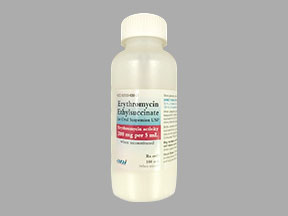
E.E.S. Granules Coupons & Savings Card – Discount Prices from $62.58
Brand for: Erythromycin ethylsuccinate
Erythromycin is a macrolide antibiotic prescribed to treat and prevent various bacterial infections. It functions by inhibiting the growth of bacteria, making it effective solely against bacterial infections and not viral ones like the common cold or flu. It's important to use this antibiotic only when necessary to ensure its effectiveness for future infections.
Our E.E.S. Granules coupons are free to use. You can print the coupon, email it to yourself, or receive the E.E.S. Granules coupon via text message. To get your free discount, show the pharmacist your E.E.S. Granules savings card which has the discounted coupon price. Use our filters below to edit the prescription box to match your needs. The E.E.S. Granules prices will update based on your prescription needs. Above our E.E.S. Granules coupons, you can change the location to see pharmacy prices in other areas. Our prescription discount card will update online with the specific pharmacy costs associated with your edits. Be sure to text, email, or print the E.E.S. Granules savings card code that you need after editing the prescription box and location field. Show the discount card to your pharmacist before paying.
My prescription
Edit
100ML of 200MG/5ML, Erythromycin Ethylsuccinate (1 Bottle)
Select pharmacy

CVS
$62.58
COUPON PRICE
Walgreens
$109.16
COUPON PRICE
Albertsons
$119.08
COUPON PRICE
Walmart
$132.73
COUPON PRICEE.E.S. Granules savings card
Show this card to your pharmacist
CVS
$62.58
BIN
ID
PCN
GRP
019876
LH202122B1
CHIPPO
LHX
Powered by
Erythromycin is a macrolide antibiotic prescribed to treat and prevent various bacterial infections. It functions by inhibiting the growth of bacteria, making it effective solely against bacterial infections and not viral ones like the common cold or flu. It's important to use this antibiotic only when necessary to ensure its effectiveness for future infections.
Our E.E.S. Granules coupons are free to use. You can print the coupon, email it to yourself, or receive the E.E.S. Granules coupon via text message. To get your free discount, show the pharmacist your E.E.S. Granules savings card which has the discounted coupon price. Use our filters below to edit the prescription box to match your needs. The E.E.S. Granules prices will update based on your prescription needs. Above our E.E.S. Granules coupons, you can change the location to see pharmacy prices in other areas. Our prescription discount card will update online with the specific pharmacy costs associated with your edits. Be sure to text, email, or print the E.E.S. Granules savings card code that you need after editing the prescription box and location field. Show the discount card to your pharmacist before paying.
More prescriptions for urinary tract infection
coupons from$25.59Save 88%
coupons from$4.79Save 95%
coupons from$5.89Save 82%
coupons from$37.93Save 84%
coupons from$1500.13Save 83%
coupons from$223.90Save 88%
coupons from$91.31Save 65%
coupons from$4.55Save 87%
More prescriptions for urinary tract infection
Minocin Save 88%coupons from $25.59
Ciprofloxacin Hcl Save 95%coupons from $4.79
Mondoxyne Nl Save 82%coupons from $5.89
Cefadroxil Save 84%coupons from $37.93
Nitrofurantoin Anhydrous Save 83%coupons from $1500.13
Sulfadiazine Save 88%coupons from $223.90
Erythromycin Base Save 65%coupons from $91.31
Levaquin Save 87%coupons from $4.55
E.E.S. Granules (Erythromycin Ethylsuccinate) dosage forms
Use our E.E.S. Granules (Erythromycin Ethylsuccinate) 100ML of 200MG/5ML coupon with prices from $62.58 for 1 Bottle. You can also use our E.E.S. Granules (Erythromycin Ethylsuccinate) 100ML of 200MG/5ML coupon with prices from $106.86 for 2 Bottles. We have a E.E.S. Granules (Erythromycin Ethylsuccinate) 100ML of 200MG/5ML coupon with prices from $159.14 for 3 Bottles.
Dosage Quantity Price from Per unit 100ML of 200MG/5ML 1 Bottle $62.58 $62.58 100ML of 200MG/5ML 2 Bottles $106.86 $53.43 100ML of 200MG/5ML 3 Bottles $159.14 $53.05
| Dosage | Quantity | Price from | Per unit |
|---|---|---|---|
| 100ML of 200MG/5ML | 1 Bottle | $62.58 | $62.58 |
| 100ML of 200MG/5ML | 2 Bottles | $106.86 | $53.43 |
| 100ML of 200MG/5ML | 3 Bottles | $159.14 | $53.05 |
E.E.S. Granules FAQs
Is EES the same as erythromycin?
Yes, EES is a brand name for erythromycin ethylsuccinate, which is a form of the antibiotic erythromycin.
What type of antibiotic is EES?
EES, or erythromycin ethylsuccinate, is a macrolide antibiotic.
Is erythromycin ethyl succinate the same as erythromycin?
Erythromycin ethyl succinate is a form of erythromycin. It is an ester of erythromycin, which means it is chemically modified to improve certain properties, such as absorption. While both contain the active antibiotic erythromycin, erythromycin ethyl succinate is specifically formulated for better oral absorption and is often used in liquid formulations.
